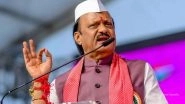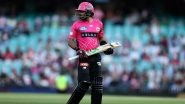He was the consummate artiste who performed his first concert when he was just seven, going on to captivate audiences with his sheer exuberance and talent for more than six decades. Yet Zakir Hussain would get nervous before he went on stage and thanked his “lucky stars” for that. Ustad Zakir Hussain Passes Away: Sachin Tendulkar Pays Heartfelt Tribute to Legendary Tabla Maestro (View Post).
The 73-year-old, amongst India's most celebrated musicians, died in a San Francisco hospital early on Monday.
In an interview with PTI earlier this year, Hussain quoted sitarist Ravi Shankar as saying he would be really worried about the show if he didn't get nervous.
“It meant that his focus wasn't 100 per cent on, it meant that he was taking this for granted. And you know it's true. Over the years, you get to a point where you have built up a reputation, you have built up some kind of a status for yourself, and the more you have done it the more responsibility falls on your shoulders because you have got to live up to that,” Hussain told PTI.
Hussain, who made the tabla more popular and recognisable to western audiences and was the founding member of the fusion group Shakti, added that performance pressure can be compared to the Indian cricket team when it plays in India.
“The amount of nervousness or some minor tension increases from day to day. I mean, look at the Indian cricket team playing in India, the pressure on them is 100-fold more than the pressure on the visiting team. I do really thank my lucky stars that I still get that little hint of tension or nervousness before I go to a concert.”
The percussionist, who started touring when he was just 12, won three Grammy Awards at the 66th edition of the Grammy awards earlier this year. He was known for having worked with Indian and international musicians, defying genres and creating masterpieces such as "Planet Drum", a world music album with American percussionist Mickey Hart that was awarded the first-ever Grammy for Best World Music Album in 1992.
The son of Allah Rakha, Hussain said “all inclusive musical creativity” came naturally to him as someone who had learnt and worked with the all-time great tabla legend who also composed music for some films.
“From the age of seven or eight, I would go with him to all his recording sessions with Asha ji or Lata ji, or Rafi and be part of the orchestra… He would give me a khanjari or a tambourine or a little something to play. So I grew up in this situation where being in a combination of musical creativity, which was an all inclusive process as opposed to a singular one, seemed like a natural way to go,” he remembered.
“So the mindset as I was growing up tuned itself to the idea that music is music, it's not Indian music or that music, so when I actually started working with musicians who were non Indian it seemed like a natural handshake,” Hussain added.
Tabla had long been viewed as an accompaniment in Indian classical music and over the years moved out of the shadows to become a centerpiece.
Hussain thanked his father and his contemporaries, especially Pandit Kishan Maharaj and Samta Prasad, for bringing notice to the humble percussion instrument.
He said it was their work with people like Pandit Ravi Shankar, Ustad Vilayat Khan, Ustad Ali Akbar Khan, Ustad Bismillah Khan, and Pandit Birju Maharaj that audience really started to notice “that this other guy is not so bad and is cool and things started to happen”. Ustad Zakir Hussain Passes Away: Prime Minister Narendra Modi Pays Tribute to Iconic Tabla Maestro; Calls Him a ‘True Genius’ (View Post).
“And because of that we the tabla players in the next generation got a launching pad. So things were readymade but yes we had to make best use of that and luckily we were able to make that connection,” Hussain added.













 Quickly
Quickly


